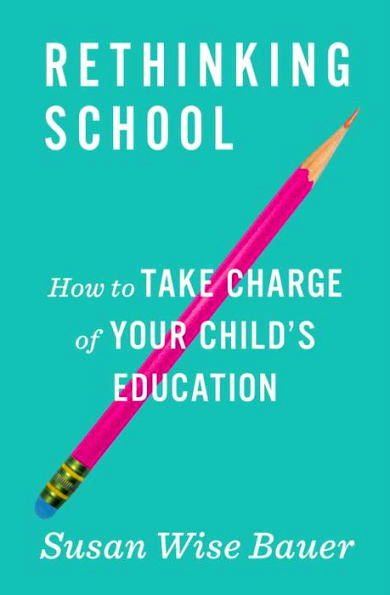Book review: ‘Rethinking School’
Published 12:00 am Sunday, August 5, 2018

- BOOK REVIEW
“Rethinking School: How to Take Charge of Your Child’s Education” by Susan Wise Bauer. New York: W.W. Norton & Co., 2018. 288 pages, $25.95 (hardcover).
“Children are infinitely varied: made up of a riotous myriad of aptitudes, ways of understanding, physical and intellectual and emotional talents; maturing on a huge spectrum of readiness, from those who were born old souls to the recklessly heedless young adult; some finding a clear path forward very early, others still struggling to find purpose into their 20s.
Trending
“School varies little. Less, as each grade ascends.”
So begins “Rethinking School: How to Take Charge of Your Child’s Education,” Susan Wise Bauer’s discourse on what’s wrong with today’s public schools and, more importantly, what we can do to get them back on a more positive track. Admittedly, I am always a little skeptical of this kind of foray into the deficiencies of today’s educational institutions. Most authors seem much more proficient at describing the extent of the problem than they do with prescribing a reasonable solution for those ills. As such, I was a little surprised by my reaction to this exquisite addition to the ever-growing canon on how to “fix” education. It was obvious from the very first page Bauer’s insight and vision extend way beyond her contemporaries.
Both personally and professionally, I found Bauer’s treatise inspiring. Although I don’t agree with every tenet of her proposed strategy for reinventing our entire approach to education in the United States, I certainly empathize with the notion we have tremendous room for improvement. At the heart of her thesis is an undeniable assertion: Many of the foundational principles currently forming the architecture upon which our entire system of schooling is built are fundamentally flawed. Those supposed truisms include the mostly irrational value placed on accreditation, the unquestioned yet widely accepted maxim that core subjects must be taught sequentially in a progressive manner as students proceed through formal grade levels, and the widespread belief that grades actually matter, particularly in the early years.
You should now have a sense of why many of Bauer’s ideas have not been warmly received within the traditional educational establishment. If you pay close attention to what she is saying with an open mind, however, the logic behind her conclusions and the recommendations stemming from them start to become clear – especially if you have a son or daughter attending a public school. More than anything else, “Rethinking School” is a primer on how to overcome many of the trials both parents and students face on a daily basis in contemporary American schools: bullying, incompetent teachers and an overemphasis on standardized tests. It is her practical advice on these and a whole host of interrelated issues that I found most beneficial.
With respect to bullying, for example, consider the following from “The Toxic Classroom,” the sixth chapter and one of my favorites. See if you can visualize what Bauer is describing.
“If you become aware of an unhealthy situation, intervene,” the author advises. “And the younger the child, the more prompt your intervention should be. You may hear the opposite advice: It’s important for children to work out their own problems. School is a place where they should be figuring out how to act independently. Teach your child to talk back to the bully/avoid the bully/understand the bully/defuse the bully. Learning how to deal with a bad teacher is an important step in maturity – it will help your child later in life when he has to deal with a bad boss. …
Trending
“I disagree,” she continues. “Vehemently. Children in school are powerless. They have been placed in a situation where they have no freedom of movement, no option to walk away or quit or leave. They’ve probably been taught that being a tattletale is a bad thing, yet they have no legitimate weapons of their own to use against bullies and shamers. Dealing with a bully or a hostile teacher requires a sophistication and clarity that adults have a hard time achieving – let alone eighth-graders. Or third-graders. Or kindergarteners. Intervene and protect.”
I absolutely feel Bauer is advocating the right approach here. Perhaps if parents, teachers and other administrators would take a more proactive stance against bullying, we would see a significant drop in the number of school shootings. Many of the perpetrators, you may recall, were bullied by their peers and/or school officials.
Bauer, who has a Ph.D. in American studies from the College of William and Mary (where she also taught for 15 years), is publisher and editor-in-chief of Well-Trained Mind Press. She is the best-selling author of the “Story of the Mind” as well as the “History of the World” series; her previous books include “The Story of Western Science: From the Writings of Aristotle to the Big Bang Theory,” “The Art of the Public Grovel: Sexual Sin and Public Confession in America,” and “The History of the Renaissance World: From the Rediscovery of Aristotle to the Conquest of Constantinople.”
“Rethinking School” consists of 21 chapters arranged in five major sections: “The System,” “Mismatches,” “Taking Control,” “Rethinking the System” and “Opting Out.” She also includes a postscript, “About College,” that – given my chosen profession – I found exceptionally intriguing, and three inherently enlightening appendices: “High School and the Transcript,” “Skills vs. Content” and “A Brief Essential Bibliography.”
All in all, Bauer seems to have a firm grasp on the subject matter that forms the scaffolding for this mesmerizing volume on how parents can provide their children with an exceptional education given the challenges currently defining our vast public school system. Bauer has written an important book; it needs to be read by everyone who is concerned about our future generations (hopefully all of us). Highly recommended.
– Reviewed by Aaron W. Hughey, Department of Counseling and Student Affairs, Western Kentucky University.







